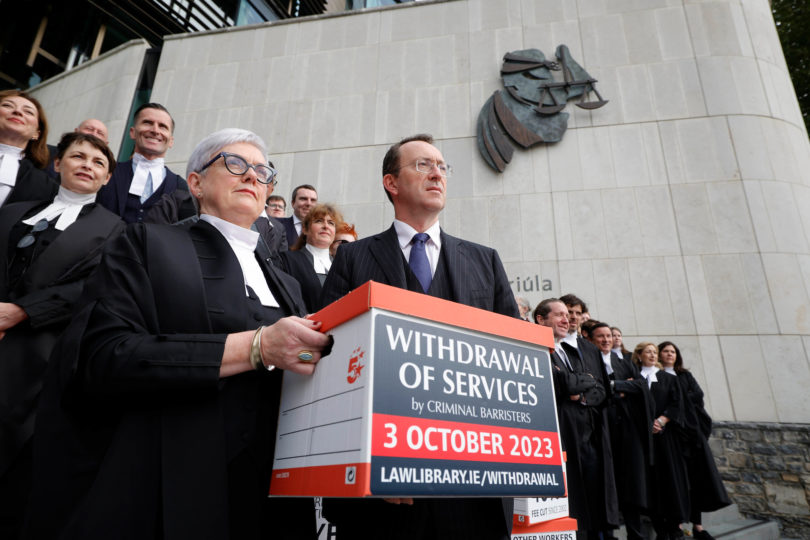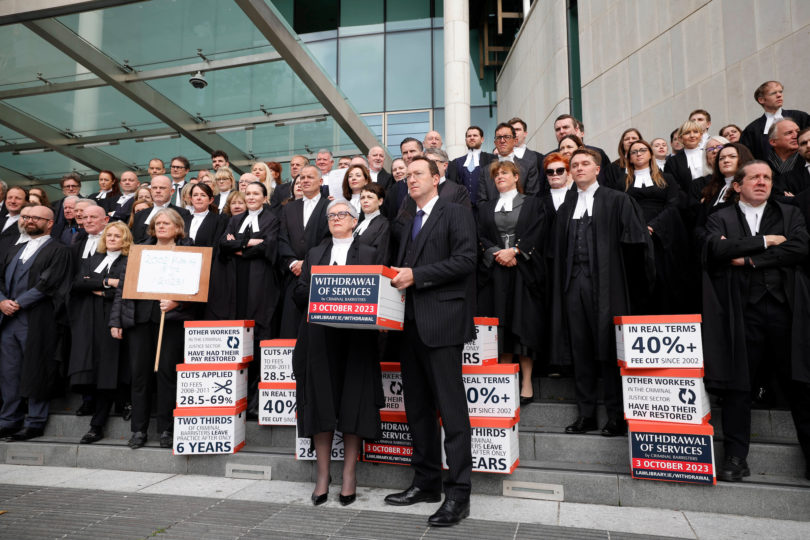- Tuesday July 9th first of three days of withdrawal in July.
- Protests to take place at 16 courthouses nationwide.
- Two thirds of criminal bar leave the profession after 6 years.
- Lack of investment by successive Governments causing delays in criminal justice system, impacting victims of crime.
8 July 2024
Following a recommendation from the Council of The Bar of Ireland last month, criminal barristers around the country will withdraw their services this Tuesday, July 9th in the first of three days of withdrawal this month.
On Tuesday, 9th July, protests will take place at 16 courthouses nationwide where criminal cases were due to be heard on the day, including the Criminal Courts of Justice in Dublin; Ennis, Co Clare; Washington Street, Cork; Tralee, Co Kerry; Naas, Co Kildare; Kilkenny City; Limerick City; Castlebar, Co Mayo; Longford town; Trim, Co Meath; Sligo town; Clonmel, Co Tipperary; Bray, Co Wicklow; Waterford City; Wexford town.
This is an escalation on the unprecedented action taken by criminal barristers all over the country on October 3rd last, with the aim of seeking an independent, meaningful, time-limited and binding mechanism to determine the fees paid to criminal barristers by the Director of Public Prosecutions and under the Criminal Justice (Legal Aid) Scheme. To date, the Government has failed to engage with that independent review process, despite almost a year to do so.

The Council of the Bar of Ireland undertook in a series of engagements in advance of the impending action with justice and finance spokespersons of all the main political parties, as well communicated in June directly with An Taoiseach, Simon Harris TD, Minster for Finance, Jack Chambers TD, Minister for Public Expenditure, NDP Delivery & Reform, Paschal Donohoe, and Minister for Justice; outlining need for a resolution in the matter, and the longer term systemic risks to the administration of justice in the case of continued inaction on the Government’s part.
Following the first withdrawal on October 3rd 2023, a 10% restoration was subsequently announced in Budget 2024 on October 10th 2023. However, even after this 10% was restored, the full range of FEMPI-era cuts that were applied across the public sector, continue to apply to the profession, and the unilateral breaking of the link (in 2008) to public sector pay agreements has yet to be restored.
This is despite a Government commissioned review in 2018 acknowledging that the reversal of the cuts was justified given the level of reform and flexibilities delivered by the profession.
In a member briefing published last week, practitioners who are participating in the withdrawal were advised that the action would entail not attending at any criminal court for court work, not engaging with associated court administration on that day, and not claiming professional fees for the day.
While the disruption to the various court jurisdictions may differ, the Bar has actively engaged with the Judiciary, Courts Service and relevant state bodies to allow for alternative arrangements. In addition, participating members were advised of exceptional types of cases and scenarios where barristers should continue to provide services.

Sara Phelan SC, Chair of the Council of The Bar of Ireland said:
It is with regret that we have recommended to criminal practitioners that they withdraw service again. No barrister wishes to be in this position, but we have been left with no choice. The Government has just reported on the complete unwinding of FEMPI legislation this month, yet FEMPI-era cuts still apply to our profession. This is despite the fact that the role of criminal barristers has evolved significantly in that time frame, and we have at all times delivered on the required reforms and flexibilities. Yet, barristers continue to be treated differently to others in the criminal justice system and indeed to society at large.
All we are seeking is fairness, and for appropriate investment in the criminal justice advocacy service, through an independent review so that work in 2024 is fully reflected and sustainable. A failure to so invest will result in continued attrition at the criminal bar, which will in turn add to the delays already being experienced by members of the public involved in the criminal justice system – these delays can often be very difficult, in particular for victims of crime and accused persons, all of whom are seeking to have their rights vindicated. The ball is in the Government’s court now.
Sean Guerin SC, Chair of the Criminal State Bar Committee said:
It has been acknowledged in Government that there is ‘no good reason’ why fees of criminal barristers shouldn’t be restored, yet eight months on from a commitment to establish a process reviewing the fees, no meaningful progress has been made.
In addition to the recognition back as far as 2018 that all cuts applying to criminal barristers should be unwound, the engagement we have had with Oireachtas and indeed Government TDs and Senators has also reflected that position.
The impact of inadequate fees is having a corrosive effect on the retention of counsel in criminal practice and this isn’t just a matter that affects barristers, it’s also a matter of social justice. A lack of experienced and available barristers to fully and properly defend or prosecute a case, leads to inequality and injustice, which have an impact on everyone in society. Public trust in the criminal justice system should not be taken for granted, and must be protected,”
The Council of The Bar of Ireland has recommended a withdrawal of service by criminal law barristers nationwide on the following dates: Tuesday July 9, Monday July 15, and Wednesday July 24.
